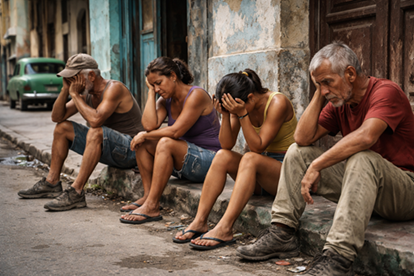Junior Murray
Perhaps one of the most hated words in the modern American society — one often used as a term of derision — is the word “liberal.” The vehemence and the scorn attached to the word are akin to the New Testament biblical references to the “publicans and sinners.” It is often hurled at others by some in a manner likened to a racial epithet. In its current usage it has a connotation not only of undeserved assistance or advancement, of unnecessary waste, and of a woeful pandering to lawlessness within society, but also one which reeks of rank immorality and gross religious apostasy.
As a portrait of shame and distrust which emanates from the paint brush of its usage, the converse is true for the word “conservative” which is often fashioned by some into a much vaunted cultural edifice with trappings of holiness, high moral and family values, and a sober and pragmatic world view traversing economics, politics, law and religion. Conservatism, though often spoken of in transcendent tones in 21st century America, belies, denies, and decries the democratic and the cultural pluralities of the country making its claims not only spurious but also debatable.
Unlike the word “liberal”, the word “conservative” is often spoken of by many not only as a panacea for all of the ills which plague society, but as a somewhat vague ideology which covers a multiplicity of positions all assumed to be co-equal, co-dependent, complimentary and symbiotic, but which, in reality, are sometimes at diametric poles to one another. This writer once worked with a young, white, religious woman in a social service agency. She bore the title of “conservative”, proudly, spouting the usual party line of fiscal responsibility and a strict adherence to strong Christian and “traditional” family values. But she was silent on other controversial issues also seen as falling within the veil of “conservatism”.
This writer opines though, her views were understandable, and well-intentioned that they were, incredibly naive within the full context of life in America as we now experience it. She failed to see, for example, that some of her brethren — especially the white male of the species in her political camp — would rather mothball all social service agencies like the one she worked in at the time and would want to see her, as well as all people of her gender, back at home barefoot, pregnant and in the kitchen. As to this writer, a Black man, they would have him back on the plantation picking cotton or cutting cane.
Granted, there are rational-minded people who can be found in either camp. Their understanding of “good” and “evil” is universal. Will those who prioritize fiscal responsibility — whether on a private, domestic level or on a public, societal level — only be found in the “conservative” camp? Was the country ever homogeneous in its political positions — nationally and internationally?
The way that the U.S. Constitution was written by the founders, with its attendant Bill of Rights, and the way that they delineated and disseminated power among the three branches of government — namely the executive, the legislative and the judicial — inferred their recognition of such differences in the American milieu and as they existed elsewhere in the world at the time. In fact, the 13 colonies prior to the War for American Independence were able to agree on a goal that they saw as beneficial to the colonists, yet agree to disagree on the contentious issue of chattel slavery. And so the Constitution of 1787 was minted out of the fires of harsh, contentious, real world experiences. Its 27 amendments to date speak of ongoing dialogue and of consensus.
In the Christian religion, as practised here in the U.S., many who see themselves as scrupulously “conservative” in theological orthodoxy and in their exposition of the same in the routine of life often falter in their execution of basic Christian tenets, especially when it comes on to helping the needy among them and doing for their neighbours as they would want their neighbours to do for them. For such “conservatives” there is a pass on loving their enemies as the Scripture teaches.
Then there are the religious “liberals” who have a strong and enviable “Social Gospel”, but the teaching on the divinity of Christ, among other doctrines, as far as they are concerned, is quite questionable.
The American society today is polarized with many individuals lacking intellectual curiosity, others unwilling to pursue truth for truth’s sake, and still others showing disinterest in basic civility. They remain in blind obstinacy and are mired, deeply, in an immature and in a highly fearful and regressive mental universe which they claim, delusively, as their own but which, in fact, was of someone else’s making. They are, more accurately, as the mice being led away to their own destruction — as in the tale of the Pied Piper of Hamelin — to the hyperbole of demagogic strains. They are those who hold to the view, asking, in the apt words of a family member of this writer, “Who needs facts when you have opinions?”
Another word which causes tempers to flare among some in the U.S. is “compromise”. It once bore a “give-and-take” connotation with an outworking which was indispensable to the establishment, and to the survival and progress of democratic principles and processes. No longer does it mean “An agreement or a settlement of a dispute that is reached by each side making concessions.” It is now a door — left carelessly ajar — to vice, to treason, and to utter destruction. On the political landscape this unyielding and implacable attitude entails the vilification of all political opponents as a winning strategy. Former GOP Speaker of the House Newt Gingrich was the chief architect of it.
Now, this writer does not want to appear unrealistic, because everyone holds philosophical, ideological and religious beliefs that are non-negotiable. Being “liberal” on certain issues can violate the well-being of others as is being “conservative” in other respects. But when such positions are insensitive to the humanity of others, when they do not recognize the right of others to hold opposing views, and when they challenge well-established laws designed to safeguard such views, freedoms and the right to simply exist, through subterfuge, obstructionism, intimidation and violence, then “Houston, we have a problem”.
Nobody, in reality, is 100 per cent “liberal” or “conservative” about everything in society. If, for example, being “liberal” is to entertain excessive regulations on businesses, then this writer is a “conservative”. If being “conservative” means that industry should be allowed to exploit natural resources for profit, threatening global pollution and the extinction of every living thing, then he has to cast his vote against it with the “liberals”. Should “compromise” mean allowing the reinstatement of child labour, the continuance of unequal opportunities for all, of unequal pay for women for the same work done by men, or of a denial of voting rights for all, then he cannot do so.
Newt Gingrich and his acolytes poisoned the wellspring of “give-and-take” in the world of politics. This ability to “agree to disagree”, to remain civil with each other, and to be pragmatic about the challenges which face the nation within the context of real world experiences, existed and thrived for decades before him. And if, as a consequence, obdurate “selfishness” is allowed to masquerade under any or all of the above labels, then what is the use of the U.S. “democratic experiment?”
Do we want democracy as the founders intended, or do we want some form of oligarchy or totalitarianism? The following statement by the late Emperor of Ethiopia, Haile Selassie, is not only insightful in terms of the polarization which currently exists in this country, but it is also prophetic in respect to the dangers which have been plaguing this nation in recent years because of it. It is a cautionary word as our current track of arguing about everything, just for the sake of arguing, is unsustainable in respect to our democracy’s survival: “Above all, we must avoid the pitfalls of tribalism. If we are divided among ourselves on tribal lines, we open our doors to foreign intervention and its potentially harmful consequences.”



